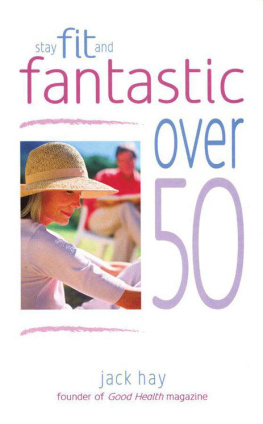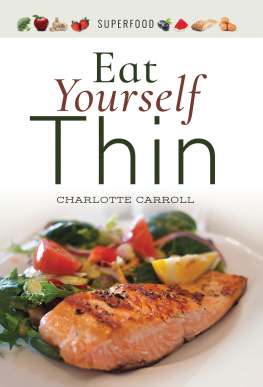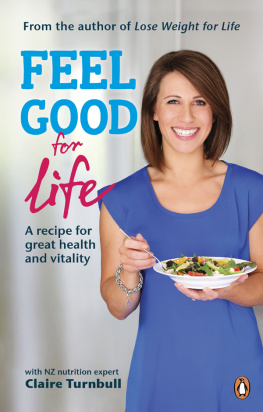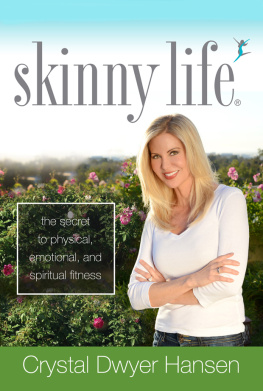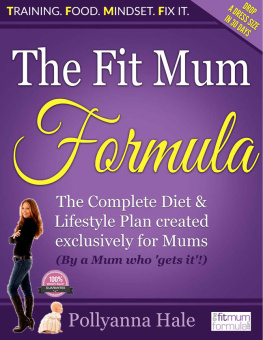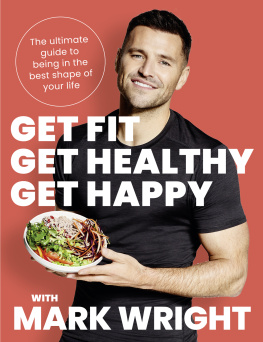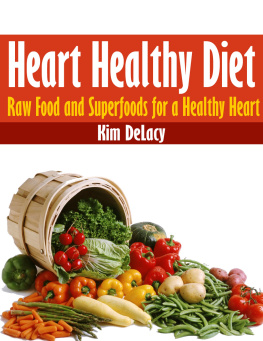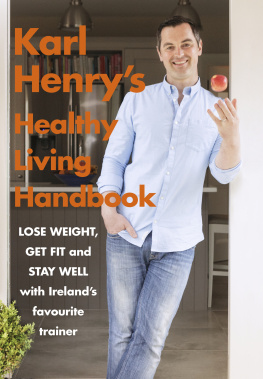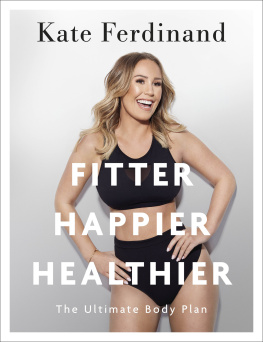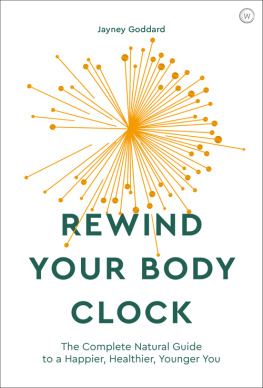
Table of Contents
Acknowledgements
I would like to thank my wife, Sue, for the unstinting help and encouragement she provided with the researching and writing of this book, and especially for being a wonderful sounding-board for the original concept.
I would also like to thank all those health writers, doctors, nutritionists and fitness experts who were so supportive during the time when we were publishing Good Health magazine, and who now help with SlimSeekers, our weight-loss consultancy. Their expertise helped provide much of the background knowledge and information to be found in these pages.
Finally, a very special thanks to Wendy Hobson, Foulsham's editorial director, who guided the book through the publishing maze, and to editor Gill Holloway, who helped put my text into order, and offered yet another woman's perspective!
Introduction
You can slow down your ageing process and enjoy a healthier, more vital lifestyle.
The fact that you are reading this book suggests your age may be near that special milestone of 50 years. Alternatively, perhaps, you are simply curious about anything that could help you to live a longer and happier life. Well, you have undoubtedly made the right decision. Within the pages of this book, you will find the means to slow down your ageing process - and to maintain a healthier lifestyle that will give you more vitality than you have enjoyed for years.
There is no secret recipe for longevity. But many areas of our lifestyle influence how long we live, and in this book we will identify and define them, then show you how to take action in those areas in a coherent way with the aim of adding at least another ten years to your life. Not a bad investment for the price of this book.
If you are aged 50 or over, you have already seen quite a few changes during your lifetime. You may have been a passenger on the first jet airliner, seen the first film in Cinemascope, used the first non-stick saucepan, or driven one of the very first Minis. You will have seen the arrival of the heart pace-maker, the birth control pill, the microwave oven, satellite TV and the first portable music cassette players. You will have watched the first man step on to the moon. The last 20 years have brought a flood of new inventions - pocket calculators and home computers, video recorders, CDs, DNA fingerprinting, e-mail and internet access, mobile telephones and, the most important of all, the TV remote control! All of these were unknown to our parents when they were young, and yet our children take them all for granted.
The largest section of the population is now aged over 50 and the numbers are growing fast. In the year 2000 there were around 600 million people in the world aged 60 or over. There will be 1.2 billion by 2025.
The question is: how do we actively encourage nature to make us live longer? And more importantly, how do we make the most of these extra years? There is no point in being given a present if you can't open and enjoy it. And that's what this book sets out to do: to help you to achieve increased longevity - and to make the most of it!
Chapter 1
Ageing
The sooner you start to address the factors that affect ageing, the sooner you'll see results.
The search for long life has been evident throughout history, with folklore and legends telling stories of quests for the elixir of life or the fountains of youth. Magic water, rare fruits or plants and even precious stones have all played leading roles in legends over the centuries. As recently as in the last century a popular theory evolved that the bacteria in live yoghurt could extend our lives - and while it is certainly true that yoghurt has many healthy attributes, longevity has yet to be proven to be one of them.
In fact, of the many products that claim anti-ageing properties, none has been scientifically proven to work. Take, for example, the many very expensive creams on the market that claim to reverse the ageing of the skin. Although their claims cannot be proven, people still buy them, more in hope than any belief. It is too easy to convince ourselves that something will work for us, and so be exploited by clever marketing messages.
Eastern concepts of ageing are more philosophical and embrace holistic health. Early theories evolving the balancing of yin and yang energies form the basis of Chinese medicine. Some ancient Indian philosophies recommend exercise, a balanced diet and the preservation of a calm and relaxed attitude.
So what does influence ageing? We in the Western world now know that attitude, genes, diet and nutrition, exercise, mental activity and stress are just some of the many factors that do affect your longevity and continuing good health. That means there are plenty of different ways in which you can add more years to your life. More importantly, you can put more life into your years, by adopting simple measures or philosophies to help reduce the effects of ageing. For example, people who are generally optimistic and positive about their advancing age are 19 per cent less likely to die prematurely than people who fear the idea of getting old - this is a fact established by the Age Research Centre in the USA.
Achieving optimum life expectancy
The optimum physical life span of a human is believed to be around 120 years, although people who reach this age are indeed a rarity. Before 1900, 75 per cent of people died before they reached the age of 65; and in the 1850s less than 5 per cent of the population in the UK was aged 65 or over. Today, on average, a man will reach 75 years or more and a woman 85 years.
We start 'ageing' the moment we are born. Babies have a fast growth spurt up until the age of around two and a second period of fast growth starts at puberty and progresses until around 20 years of age, with all of our body growth complete by around the age of 25. Up to the age of 30 there is generally a progressive increase in the power of both mind and body. It is after this age that a gradual decline in physical and mental vigour may begin, and such decline is normally related closely to the individual's lifestyle. Most people do not actually experience any decline until they are in their forties or fifties or, for a lucky few, their sixties. Even then, while physical capacity may decrease, mental capacity can continue to increase. In fact, some people's mental capacity can reach a peak in their fifties or sixties before starting to tail off.
It is thought that the speed at which we age relates to the deterioration of our body's cells over a lifetime of wear and tear, or it may be simply that nature has a cut-off point for each of us. But, of course, we do not all live in the same way or in a similar environment, and we all have to face various demands at different stages of our lives. For example, the stresses that we may encounter can and do affect our physical health and may therefore have a negative impact on the rate at which we age. Health problems such as heart disease have increased in the Western world over the last century, largely as a result of poor diet and lifestyle.
We already have a preconceived idea of what age represents and we may be ageist in our attitude to people without even realising. For example, we will readily identify friends or relatives whom we think of as 'old'. This is usually based on a summarisation of the person's physical appearance: the style, colour and quantity of their hair, the type or style of clothes they wear, their general demeanour. Interestingly, it has little to do with actual age.
Next page
